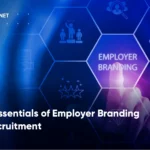According to a report by Grand View Research, the global recruitment processing outsourcing (RPO) market was valued at USD 5.5 billion in 2020, with a projected compound annual growth rate (CAGR) of 17.4% from 2020 to 2027. This growth highlights how organizations across industries are increasingly turning to RPO to scale their talent acquisition efforts more efficiently.
As the demand for specialized talent, particularly in the IT sector, continues to rise, the need for IT Recruitment Process Outsourcing has become more critical than ever. IT RPO allows businesses to overcome recruitment challenges, access global talent pools, and stay competitive in a rapidly evolving market.
But how exactly does IT recruitment process outsourcing work? What differentiates IT RPO from traditional in-house recruitment? What are the different types of IT RPO models, and how can working with an IT RPO partner benefit global organizations?
In this guide, we’ll explore these questions and more, providing insights into how IT RPO can optimize the recruitment strategy for tech roles in businesses.
Let’s dive in!
What is IT Recruitment Process Outsourcing?
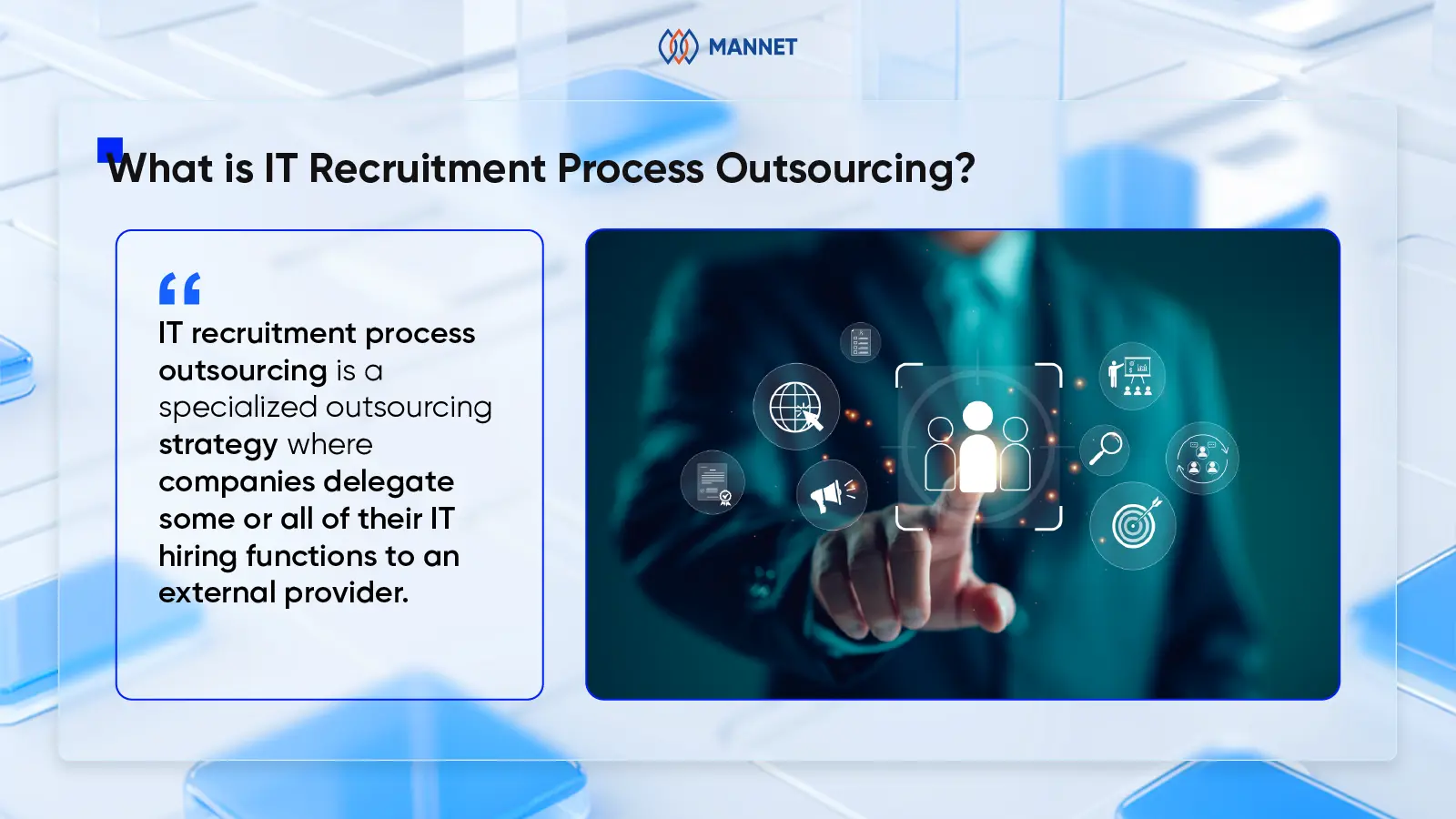
Definition of IT recruitment process outsourcing
IT recruitment process outsourcing is a specialized outsourcing strategy where companies delegate some or all of their IT hiring functions to an external provider.
Unlike traditional staffing agencies that focus on filling immediate vacancies, IT RPO companies take a more holistic approach, embedding themselves into an organization’s recruitment framework to manage talent acquisition from sourcing to onboarding. This is a prerequisite, as an IT RPO partner should acquire deep knowledge of organizational culture and aim to build real relationships to understand the pain points and opportunities in the recruitment process.
IT recruitment process outsourcing providers act as an extension of a business’s HR team to become an integral part of the talent acquisition function. With the right IT RPO partner, neither the team nor candidates will feel that the recruitment is outsourced.
Learn more: The Ultimate Guide to Recruiting Tech Talent in 2025
Key Performance Indicators for Measuring IT RPO Success
How do leaders and managers know if the RPO strategy is truly delivering? It all comes down to the key metrics that measure what matters. Keep scrolling to explore what defines a fruitful IT recruitment process outsourcing process.
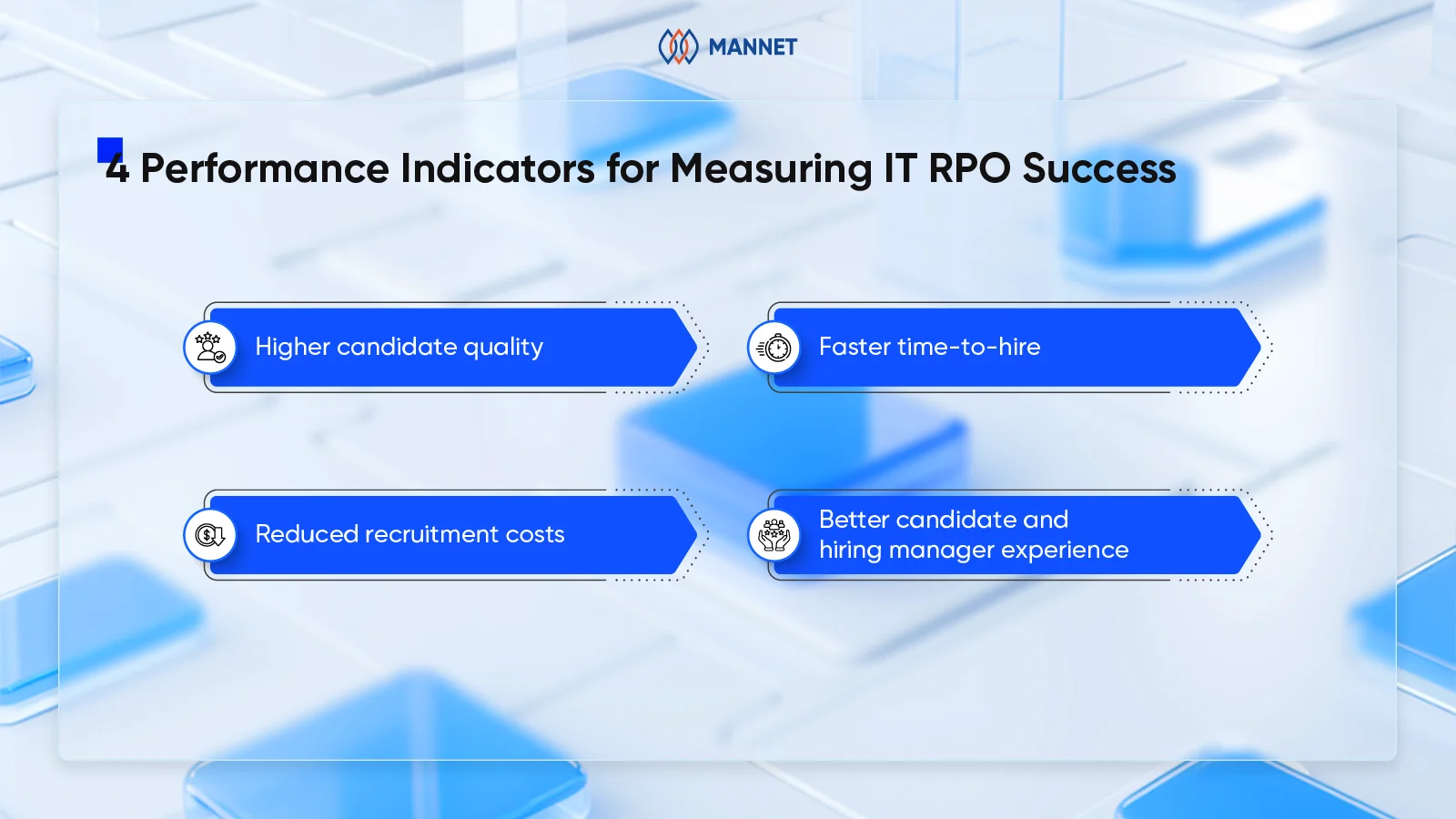
Performance indicators for measuring IT RPO success
Higher candidate quality
Measuring the quality of candidates shows businesses how effective the IT recruitment process outsourcing services are in securing the right candidates for specialized roles.
“Quality” will vary depending on the organization’s goals and what it expects from new employees. That’s why it’s vital to define what quality means in the specific context of the business.
This KPI can be measured using several indicators, such as
- How quickly a new hire reaches full productivity;
- Standard of their job performance;
- How well new hires integrate with the company culture;
- Hiring manager feedback;
- First-year retention rates.
While it’s not always easy to predict quality before a candidate starts, tracking these patterns over time can reveal which types of candidates tend to perform well.
Faster time-to-hire
The time to hire refers to the number of days between when a candidate enters the recruitment funnel and when they officially accept an offer of employment.
This KPI should be tracked separately for each role type or department, as different positions often require different timelines.
It is essential for evaluating how efficient the recruitment process is. This metric is particularly important in IT recruitment, where top candidates are highly sought after and tend to move quickly through the market. For this reason, businesses need to move fast to avoid losing qualified talent to competitors.
Reduced recruitment costs
Instead of paying for each recruitment component separately, the organization pays for a managed service, typically through cost-per-hire, monthly retainers, or project-based pricing. This model often includes sourcing, screening, employer branding support, candidate assessments, onboarding, and more.
This KPI is helpful because it offers organizations a clearer understanding of their total recruitment budget. It also highlights opportunities to optimize spending and improve cost-efficiency across the hiring process.
In the context of IT RPO, where recruitment is handled through a managed service model, cost-per-hire becomes more predictable and easier to evaluate over time. Benchmarking this figure, whether against internal goals or industry averages, can reveal how well the current strategy is performing, and where there’s room for improvement.
Better candidate and hiring manager experience
The recruitment process often shapes a candidate’s perception of the organization. A clear, responsive, and professional experience helps build trust and increases the likelihood of offer acceptance, especially in competitive IT roles.
Hiring managers also benefit from a smoother process. When recruitment partners understand the job criteria and deliver well-matched IT candidates, it reduces time spent on misaligned profiles and enables quicker, more confident decisions.
When the process works well for everyone involved, it leaves a lasting impression and adds value to the company’s hiring reputation.
Why Are Companies Turning to IT Recruitment Process Outsourcing?
More and more global companies are recognizing that the key to staying agile and innovative lies not in doing everything themselves but in strategically outsourcing their IT operations to expert partners who can deliver cutting-edge solutions with unprecedented efficiency. Let’s find out why umpteen organizations opt for IT RPO!
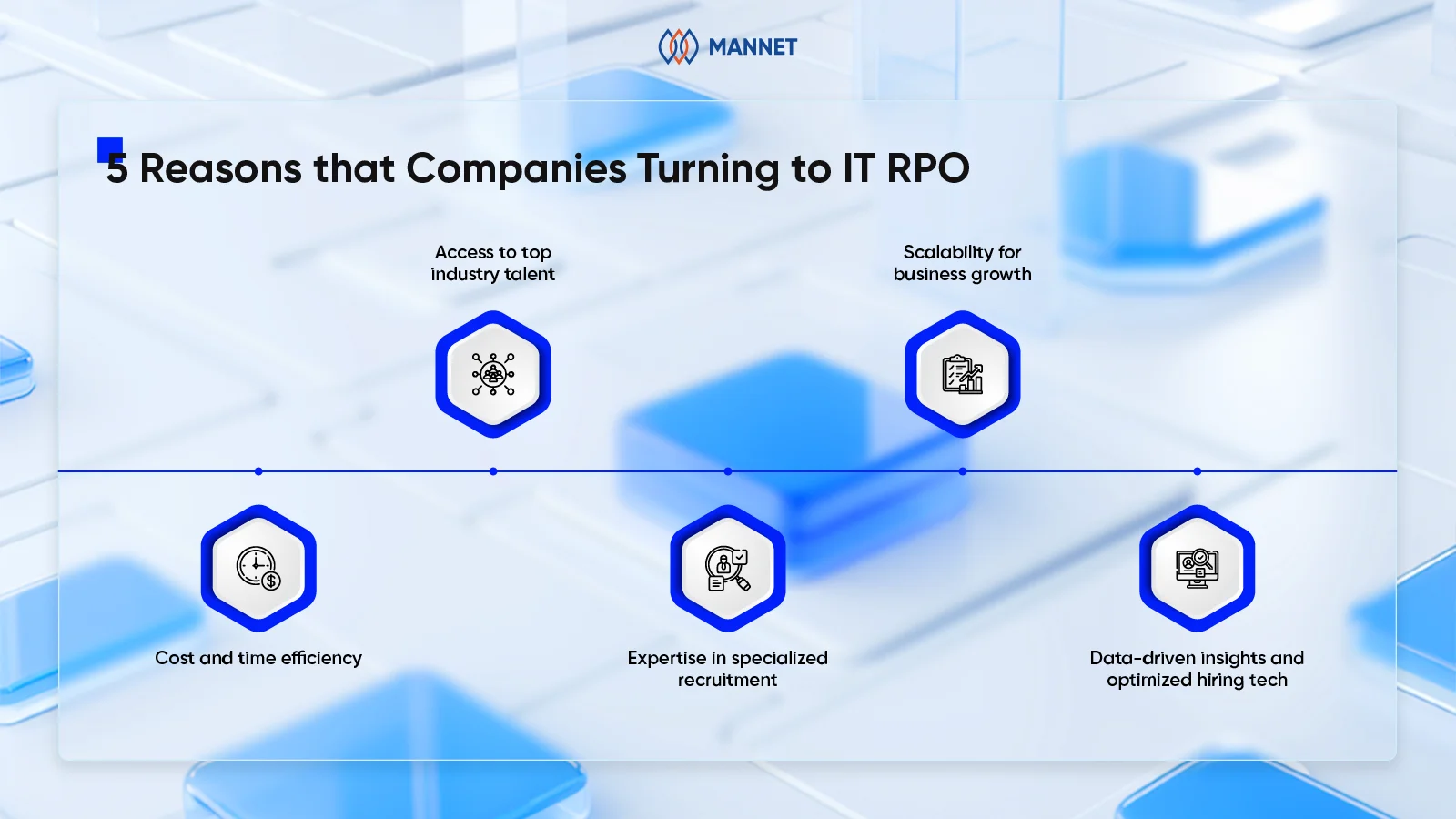
Why companies turn to IT RPO
Cost and time efficiency
A study found that companies using RPO solutions reduced their cost per hire by 25% or more and shortened their time per hire by at least 20%. These numbers are game-changing for organizations engaging in high-volume hiring, where every dollar and minute saved can add up significantly.
The economic rationale for IT RPO adoption extends beyond direct recruitment cost reduction. Organizations implementing IT RPO solutions benefit from converting fixed recruitment overhead into variable expenses that scale with actual hiring needs. This financial flexibility proves particularly valuable for technology organizations with cyclical or project-based staffing requirements.
Additionally, the accelerated time-to-hire achieved through RPO partnerships translates directly into revenue opportunities and competitive advantages that would otherwise be compromised by talent acquisition delays.
Access to top industry talent
IT RPO providers maintain strong networks within niche tech communities, including not just active job seekers but also passive candidates who aren’t browsing job boards yet may be the perfect fit for a specific role.
These partners build ongoing relationships with top-tier engineers, developers, architects, and data experts. So when the right opportunity comes up, they know exactly where to look. This expanded talent reach becomes especially powerful for organizations hiring in competitive or emerging areas like AI, cloud, or cybersecurity, where great candidates are hard to find and even harder to engage.
By tapping into these well-maintained networks, businesses significantly increase their chances of finding the right people faster and with far less guesswork.
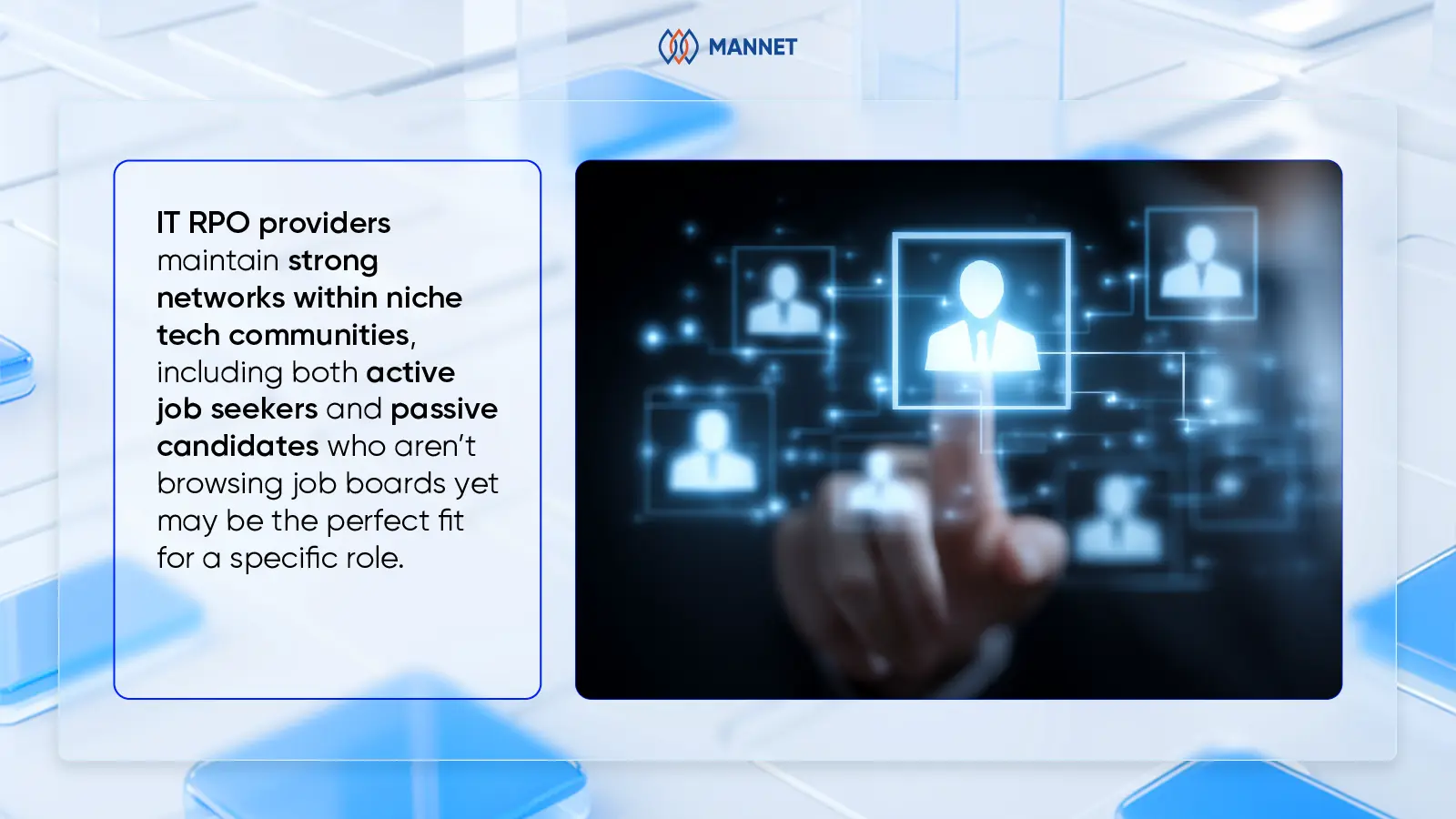
IT RPO providers have strong networks within niche tech communities
Expertise in specialized recruitment
Recruiting for areas like cloud infrastructure, cybersecurity, AI, or data engineering demands a deep knowledge of what good looks like in each domain.
Top IT recruitment process outsourcing providers bring that expertise to the table. Their teams include recruiters with hands-on experience sourcing and engaging talent across a wide range of tech specialties. They understand what makes a strong candidate, how to evaluate technical skills, and how to speak the language of in-demand professionals.
This level of specialization allows businesses to run a sharper, faster hiring process without having to build the same depth of recruitment expertise in-house.
Scalability for business growth
Tech companies rarely hire at a steady pace. Product launches, new funding, market expansion, or shifting business priorities can all trigger sudden spikes or drops in hiring needs. For internal teams, this creates a difficult balance: either overstaffed during quiet periods or scramble to keep up when demand surges.
IT RPO providers offer elastic capacity that precisely matches current requirements without the operational complexity of continually resizing an internal team.
This scalability is especially valuable for fast-growing startups or established enterprises undergoing digital transformation, where the ability to ramp up hiring quickly can directly impact delivery timelines and long-term growth.
Data-driven insights and optimized hiring tech
Leading IT RPO providers implement advanced analytics to turn recruitment from a subjective, intuition-based process into one driven by actionable data. By evaluating historical hiring data, organizations gain a clear understanding of which sourcing channels deliver the best candidates and how to fine-tune their screening and assessment strategies over time.
In addition, partnering with an IT RPO provider grants organizations access to powerful hiring technologies without the need for a large upfront investment.
This includes tools like AI-driven candidate matching, automated interview scheduling, and predictive models that forecast hiring success. Instead of building these systems from scratch, companies can plug into a ready-made tech stack and start benefiting from it immediately.
IT RPO Engagement Models: Which One Is Right for Your Business?
Before choosing an engagement model, it’s important to understand the level of involvement that businesses want from the recruitment partner. While there are various ways to categorize RPO engagement models, this article focuses on 2 common types, classified by the scope of services delivered by the provider.
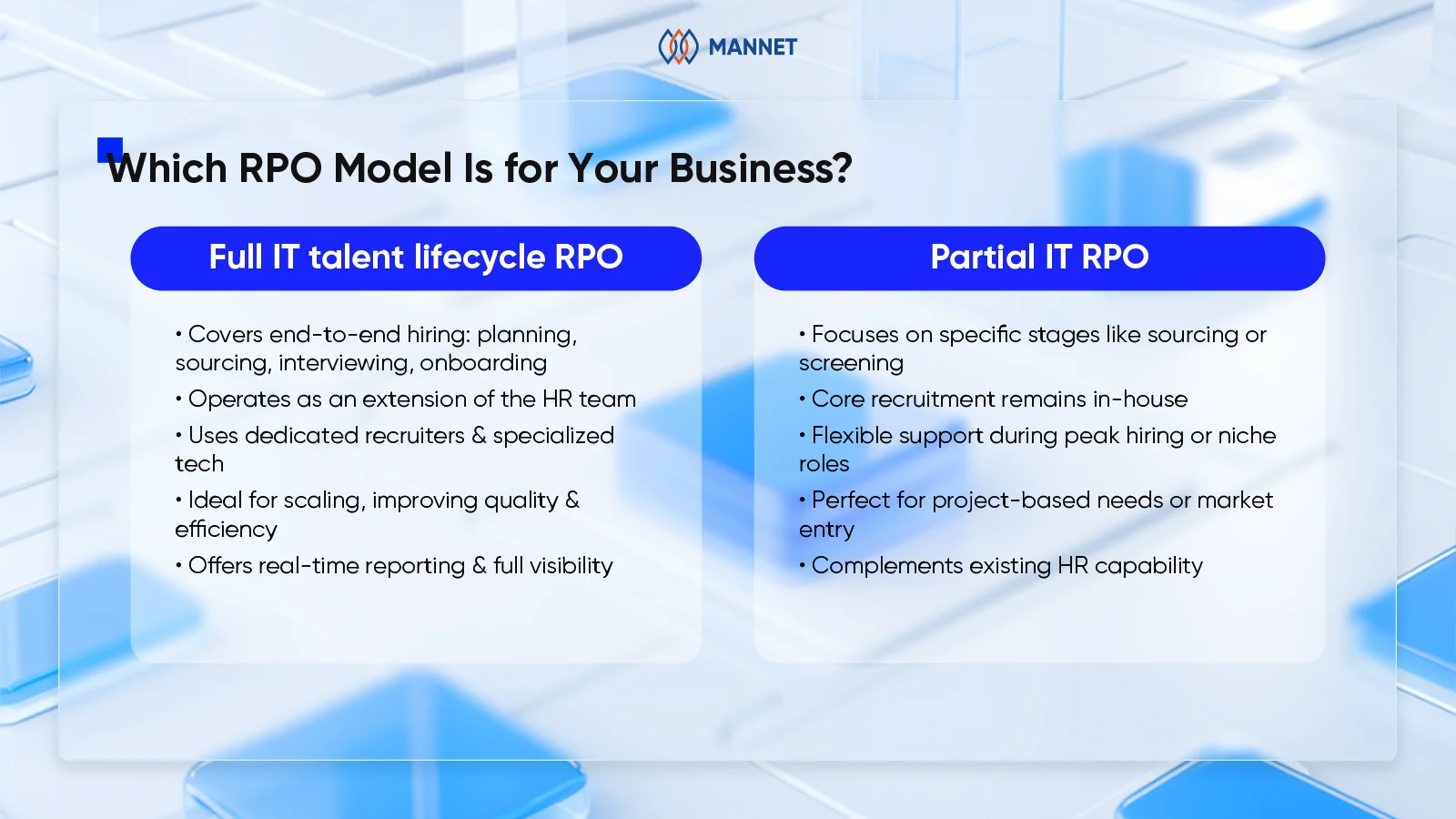
IT RPO models
Full IT talent lifecycle RPO
Full talent lifecycle RPO is the most extensive form of outsourcing, where the IT recruitment process outsourcing provider assumes responsibility for the entire recruitment function. From workforce planning and job requisition to sourcing, screening, interviewing, offer management, and onboarding, every step is managed by the provider.
Rather than serving as a short-term staffing solution, the provider operates as an integrated extension of the company’s HR or talent acquisition team. With dedicated recruiters, specialized recruitment technology, and optimized hiring workflows, this model is designed to drive long-term value across the entire hiring cycle.
This model is particularly well-suited for companies looking to scale efficiently, enhance the quality of hires, and improve recruitment operations without investing in expanding internal HR capacity. Importantly, while the provider handles the end-to-end process, the internal team still maintains full visibility and strategic oversight through collaborative workflows and real-time reporting.
Partial IT RPO
Partial RPO, also known as selective or project-based RPO, offers a more targeted and flexible engagement. Instead of outsourcing the entire recruitment process, businesses partner with an RPO provider to manage specific elements, such as candidate sourcing, screening, or initial outreach. The remaining steps, like interviewing and final decision-making, remain in-house.
This model is best suited for organizations that already possess an internal recruitment or HR capability but need additional support during periods of rapid hiring, when entering new markets, or when targeting niche technical talent. For example, a business may engage a partial RPO provider to support hiring efforts tied to a new product launch or a short-term expansion initiative.
What to Consider When Choosing an IT RPO Partner
Making an informed decision when selecting an IT RPO partner requires an evaluation of several critical factors. Below are a few strategic considerations to help businesses choose wisely:
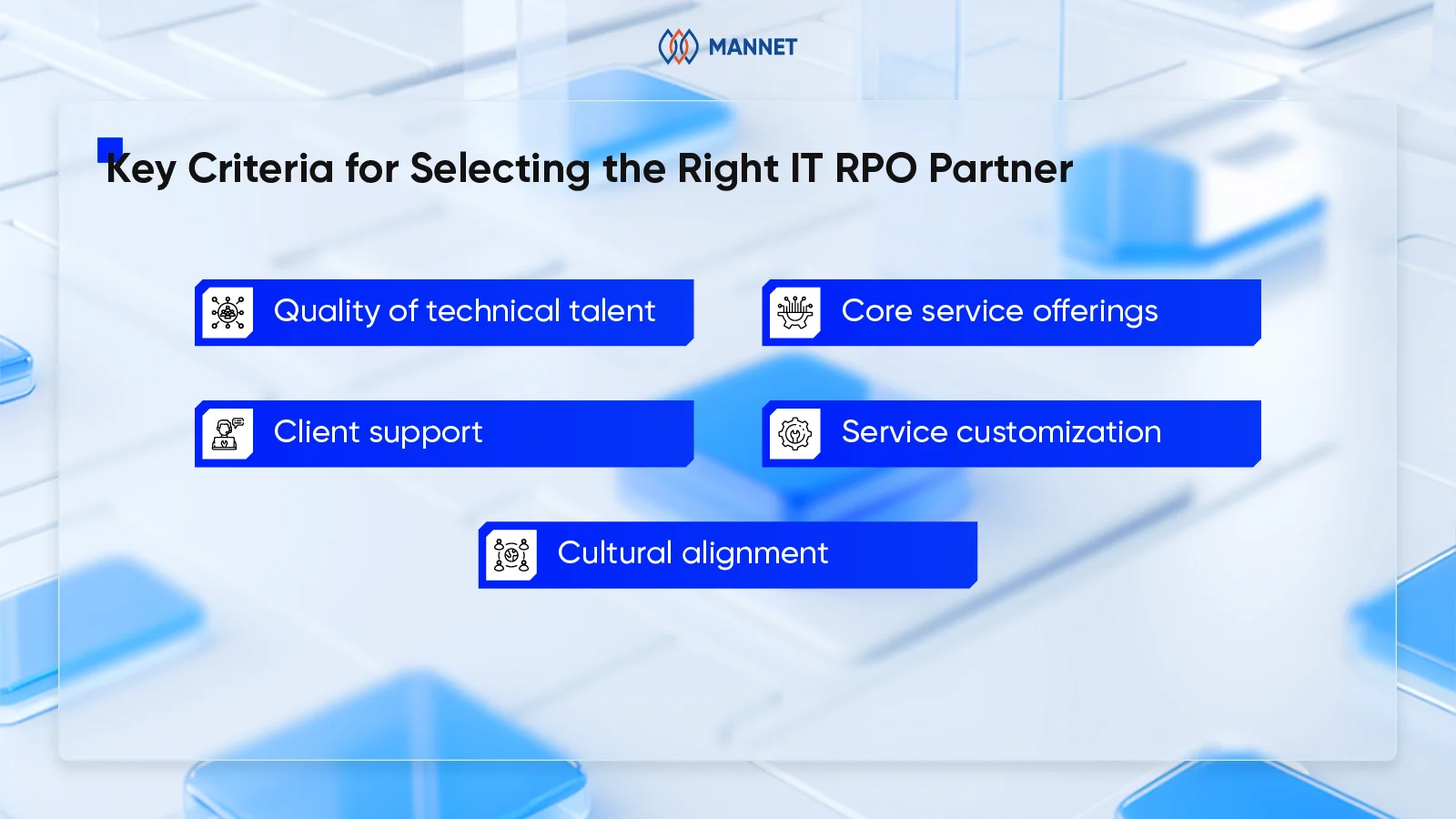
Criteria for selecting the right IT RPO partner
Quality of technical talent
The core measure of an IT RPO provider’s success is the quality of technical talent they deliver. When evaluating potential partners, organizations should assess the provider’s experience in recruiting for similar technical roles within their industry.
Key indicators to consider include retention rates for placed candidates, feedback from hiring managers, and documented examples of successful placements in specialized technical fields.
Top IT recruitment process outsourcing companies often showcase their expertise through case studies, demonstrating their success in solving complex recruitment challenges across various tech disciplines.
Core service offerings
While all IT RPO providers offer recruitment services, their capabilities can vary significantly in scope and depth. When evaluating possible partners, companies should determine whether the offers of the provider match their unique requirements for hiring new employees.
Look for a provider with experience in areas like software development team building, specialized technical assessments, and a proven track record in diversity, equity, and inclusion (DEI) within tech hiring. The most successful partnerships are those where the provider’s core strengths directly address the organization’s most critical hiring challenges.
Client support
The operational model for client engagement plays a key role in the success of an IT recruitment process outsourcing implementation. When evaluating potential partners, enterprises can evaluate communication protocols, escalation procedures, and the structure of ongoing account management. The best partnerships often include dedicated account teams with clearly defined roles and established routines for performance reviews and strategic planning.
Additionally, it’s crucial to consider the provider’s approach to knowledge transfer and documentation, ensuring that valuable insights and institutional knowledge are retained and built upon throughout the relationship.
Service customization
Every organization has unique recruitment needs, especially in the tech space. That’s why service customization is a must when selecting an IT RPO partner. Prospective providers should demonstrate both the willingness and capability to tailor their methods to fit the organization’s specific technical needs, culture, and strategic goals.
This customization should go beyond surface-level process adjustments, addressing key elements like assessment criteria, candidate engagement strategies, and success metrics. Companies should be cautious of providers offering rigid, one-size-fits-all solutions that overlook the unique nature of their technical recruitment challenges.
Cultural alignment
One of the most critical yet often overlooked factors in selecting an IT recruitment process outsourcing partner is cultural alignment. The RPO team will essentially function as a brand ambassador, representing the organization to potential candidates and shaping their perception of the company.
Organizations should assess whether potential partners truly understand and can authentically reflect the company’s technical culture, values, and employer value proposition. This alignment is especially vital in technical recruitment, where cultural fit can significantly impact a new hire’s long-term success and overall contribution.
Predictions for The Future Of IT Recruitment Process Outsourcing
As we head into 2025 and beyond, we can expect to see some significant changes in the IT recruitment process outsourcing landscape. Below are some of the key trends that will shape the future of IT RPO:
Integration of advanced technology
The future of IT RPO is powered by cutting-edge technologies like AI, automation, and data analytics. In 2024, businesses are embracing these innovations at twice the pace compared to last year, with its primary applications including drafting job descriptions, advertisements, and interview questions.
As big data and analytics continue to evolve, IT RPO providers will rely more heavily on data-driven insights to shape sourcing strategies and anticipate future talent needs. Machine learning will play a crucial role in continuously refining sourcing and assessment methods. Meanwhile, automation will handle repetitive tasks, freeing up recruiters to focus on more strategic activities, such as relationship-building and enhancing the candidate experience.
With these technologies advancing, IT recruitment process outsourcing providers are shifting from using existing tools to developing proprietary solutions, giving businesses a competitive edge in attracting top technical talent.
Prioritizing on diversity, equity, and inclusion (DEI)
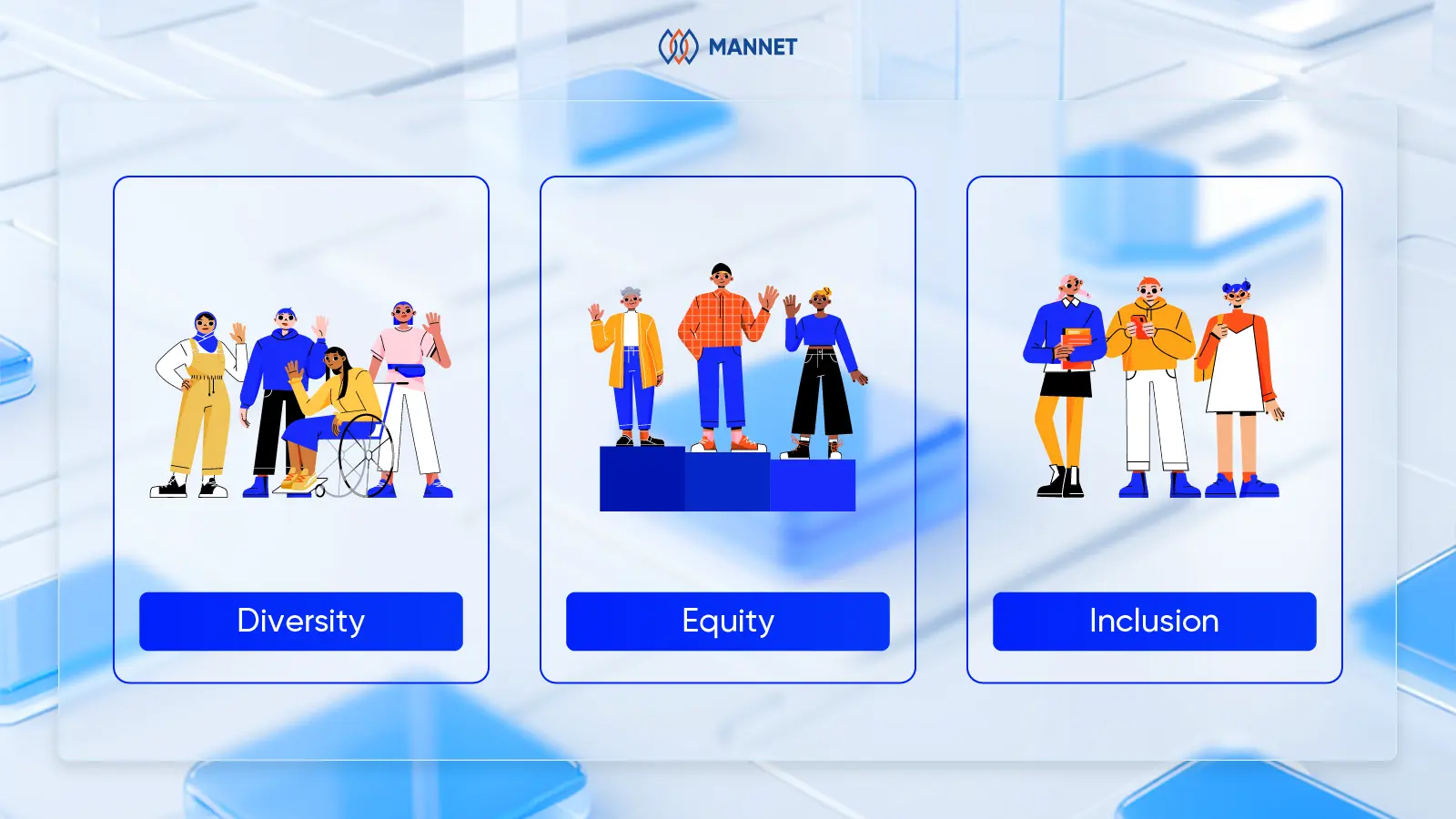
Prioritize DEI in IT RPO
IT recruitment process outsourcing providers are adopting comprehensive DEI strategies to expand candidate diversity across various dimensions, such as gender, ethnicity, age, cognitive style, and educational background. These initiatives go beyond superficial metrics, aiming to address systemic barriers with measures like blind resume screening, structured interview processes, and bias-mitigating assessment techniques.
In fact, 80% of employees say they want to work for companies that prioritize diversity, equity, and inclusion efforts. This growing demand reflects a fundamental shift in the workforce, with more and more professionals seeking workplaces that reflect their values.
As organizations increasingly recognize that diverse teams contribute to better outcomes in innovation, problem-solving, and user experience design, DEI is evolving from a compliance requirement to a strategic business priority.
As a result, diversity is no longer just about compliance but is being viewed as a strategic advantage.
Remote and hybrid work models
With the rise of remote and hybrid work models, companies are no longer limited to hiring within a specific geographic location, opening the door to a global talent pool, especially in the tech industry.
These flexible work models also contribute to DEI efforts by giving diverse candidates the opportunity to thrive, regardless of their location. 85% of workers in hybrid or remote roles prefer to continue with these arrangements in the future, showing just how important flexibility is in today’s workforce. By offering such options, companies can create a more inclusive environment where everyone, regardless of background or personal circumstances, has an equal opportunity to succeed.
As these models continue to evolve, IT RPO providers are adapting their recruitment processes to make sure they’re bringing in the best talent, no matter where candidates are located.

Rise of remote and hybrid work models in tech
FAQs About IT Recruitment Process Outsourcing
- What is IT industry recruitment process outsourcing?
IT industry recruitment process outsourcing is a specialized outsourcing service where an external provider manages all or part of an organization’s recruitment process, focusing specifically on IT roles. This can include sourcing, screening, interviewing, and onboarding candidates. IT RPO providers integrate closely with the organization to understand its technical needs, culture, and long-term goals, ensuring that the recruitment process is efficient and aligned with the business strategy.
- How does IT recruitment process outsourcing differ from traditional staffing services?
Unlike transactional staffing agencies that focus on filling individual positions, IT RPO providers implement comprehensive, strategic approaches to technical talent acquisition. They typically integrate deeply with the client organization, align with long-term objectives, and take responsibility for the entire recruitment lifecycle rather than simply providing candidates.
- Can IT recruitment process outsourcing help reduce recruitment costs?
Yes, IT RPO can help reduce recruitment costs significantly. By outsourcing the recruitment process, businesses can lower internal staffing costs and avoid the need for excessive advertising or recruitment software. Moreover, RPO providers use advanced tools and data-driven strategies to streamline the hiring process, reduce time-to-hire, and improve the quality of candidates. Over time, this leads to savings in both recruitment expenses and the costs associated with turnover and poor hires.
Final Thoughts on IT Recruitment Process Outsourcing
IT recruitment process outsourcing has become an essential strategy for companies aiming to optimize their recruitment processes. By outsourcing their hiring functions, organizations can access top-tier IT talent, reduce hiring costs, and streamline recruitment activities, all while maintaining a strong focus on long-term goals.
At ManNet, we understand that the recruitment landscape is rapidly changing, and technology is at the heart of that transformation. That’s why we offer cutting-edge IT recruitment process outsourcing services, powered by the latest in AI, machine learning, and automation, designed to help your business attract the best technical talent more efficiently.
Having partnered with some of the world’s largest businesses, we’re well-equipped to handle all the intricacies of recruitment. And now, we want to help you succeed.
So, let’s get in touch with ManNet today and see how our IT RPO services can help you find the right talent faster and smarter.



